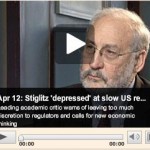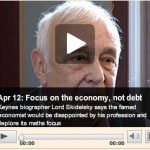Dr. Gerhard Schick, MdB
In his recent blog piece, Mathias Vernengo invokes the Brazilian phrase “The Greek Present” (Presente de Grego) or unwelcome gift, to make his point that the Euro was an unwelcome present for Greece. Rather than looking back and speculating about whether the Euro was introduced in a timely way in Greece, I want to look ahead and assert that the Greek crisis is an opportunity. Never waste a crisis. In a few years, if we succeed in overcoming the current problems, we might say that the progress made in economic governance in the wake of the Greek crisis was a gift.
Ask an Economist: Regulating Multinational Agribusiness
Triple Crisis Blog has invited readers’ questions in advance of the April 24-25 IMF/World Bank meetings in Washingon. A reader offered a detailed comment, partly in response to my post, “Agribusiness and the food crisis: a new thrust at antitrust.” Following is the reader’s comment (slightly edited for length) followed by a few responses to some of the important questions he raises, in particular about the limited regulation of uncompetitive practices across borders.
Q: “[There is a need for] further research on the abuse of monopoly and monopsony power of agro conglomerates…. The dismantling of commodity boards in developing countries in the 1980s in the context of structural adjustment programmes put the nail in the coffin of any attempt at regulating the commodity markets and ensuring equitable prices for producers…. The problem is that there is no universal anti trust law which can deal with the anti- competitive behaviour of TNCs and the international community has fallen … shy of adopting such legislation. Moreover, attempts at stabilizing commodity prices through negotiations between consuming and producing countries, which had begun in the 1970s in the context of the UN and UNCTAD, were subsequently shelved with the onset of the recession in the early 1980s and the emergence of market fundamentalism. Perhaps these issues would need to be revisited.”
Estimating the Social Cost of Carbon
For the first time, the U.S. government is working to limit carbon emissions – most notably through new fuel efficiency standards unveiled April 1. To inform cost-benefit analyses of proposed policies, the Obama administration has relied on an interagency group’s estimates of the “social cost of carbon,” the socioeconomic impact of every ton of carbon dioxide that goes into the atmosphere. The higher the social cost of carbon (SCC), the more stringent the regulatory standards that will be deemed to be worthwhile.
So far, no definite SCC has been set, but the interagency group has proposed $21 per ton. In a new Economics for Equity and the Environment (E3 Network) white paper, Liz Stanton and I analyze the economic models used by the interagency group. They find significant shortcomings, and show how they lead to substantial underestimates of the risks and costs of climate change.
New Economic Thinking
 Earlier this month George Soros created an “Institute for New Economic Thinking,” and sponsored an inaugural conference with the aim to kick start a re-thinking of macroeconomics. Click here and below for video interviews with Soros, Joseph Stigltiz, and Robert Skidelsky who share some of their thoughts at the conference.
Earlier this month George Soros created an “Institute for New Economic Thinking,” and sponsored an inaugural conference with the aim to kick start a re-thinking of macroeconomics. Click here and below for video interviews with Soros, Joseph Stigltiz, and Robert Skidelsky who share some of their thoughts at the conference.
What are your thoughts on this project and these proposals? Is this the new economic thinking we need to prevent future crises?
Will America Buy a New Climate Policy?
Without much fanfare, U.S. legislators last December unveiled a new climate bill that just might succeed in breaking the political gridlock that has blocked action on global climate change. The bill, co-sponsored by Senator Maria Cantwell (D-WA) and Susan Collins (R-ME), is a sharp departure from the cap-and-trade bill that passed the House of Representatives last June but subsequently died in the Senate.
The Carbon Limits and Energy for America’s Renewal (CLEAR) Act proposed by Cantwell and Collins is a “100-75-25-0” policy:
- 100 percent of the permits to bring fossil carbon into the U.S. economy will be auctioned. Polluters won’t get any permit giveaways, and there will be no scope for speculation and market manipulation by Wall Street traders.
- 75 percent of the auction revenue is recycled directly to the public as equal per-person dividends. The majority of households will receive more in these monthly dividends than they pay in higher energy costs.
- 25 percent of the auction revenue is dedicated to investments in energy efficiency, clean energy, adaptation to climate change, and assistance for sectors hurt by the transition away from the fossil-fueled economy.
- Zero offsets are allowed. In other words, polluters can’t avoid curbing use of fossil fuels by paying someone else to clean up after them.
Martin Khor on Climate Change, Border Taxes, and Green Protectionism
Regional Financial Governance: Lessons from the Eurozone
The strange, complicated drama involving the Eurozone’s bureaucratic core, Germany and Greece, European officials, and the IMF demonstrates that the matter of creating regional alternatives to the global financial architecture is politically charged and even fraught. The tensions raised around Greece reveal many of the deficiencies in Europe’s regional financial architecture—especially the puzzling absence of a lender of last resort, a regional surveillance mechanism, and a mechanism for coordinating fiscal policies among member nations. These deficiencies should be taken seriously by those working in the developing country context insofar as many of us have long looked toward regional financial governance as a more democratic and inclusive alternative to the global financial architecture.
Selecting the Next U.N. Climate Chief: Mr. Secretary-General, Be Bold
It is hiring season at the UNFCCC.
More precisely, the Bonn-based secretariat of the United Nations Framework Convention on Climate Change (UNFCCC) is seeking a new Executive Secretary, after the incumbent – Yvo de Boer, the third European in a row to have headed the secretariat – decided to resign after less than four years in office.
The deepest memories of Mr. de Boer’s term will remain the hype that was generated around and the subsequent failure of the 2009 Copenhagen negotiations to come up with any meaningful results. In fairness, Copenhagen cannot be blamed on Mr. de Boer. Things unraveled as they did largely for reasons outside of his control and despite his efforts. However, the timing of his departure now gives the United Nations Secretary General – who will ultimately decide on his replacement – the responsibility to find someone who can help put the climate negotiations that are now in utter disarray back on tracks. He also has the opportunity with this appointment to give real direction to the ongoing debate on improved global environmental governance (GEG), which has been floundering and rudderless for some years.
Questions about IMF/World Bank Reform? Ask a TripleCrisis Economist. Deadline for questions: this Friday, April 16.
The 2010 Spring Meetings of the International Monetary Fund and the World Bank will be held over the weekend of April 24-25 at the World Bank and IMF Headquarters in Washington, D.C. As in previous years, a Civil Society Policy Forum, a program of policy dialogues for Civil Society Organizations, will be held between April 22-25, 2010. In the wake of the triple crises in finance, development and the environment, the Bretton Woods institutions face increasing pressure for reform.
In advance of the meetings, the unique collection of international economists at the Triple Crisis Blog is taking your questions. What arguments most need sound backing from economic analysts? Which reform proposals are you unsure about?
Post your questions as comments on this blog posting, and Triple Crisis analysts will do their best to answer with blog posts. Look for answers during the meetings and in the week before. We’ll answer as many as we can. We look forward to your questions.
Note: Open full post and scroll to the bottom to leave a comment. Comments are moderated, so they may not appear immediately, but they will appear promptly.
Cleaning up the Clean Development Mechanism: Performance Standards needed to ensure carbon reductions, development benefits
The crisis in global climate talks may have clouded the future of the Kyoto Protocol but the Clean Development Mechanism seems to have a life of its own. The CDM, one of Kyoto’s three implementation mechanisms, allows companies in developed countries with Kyoto targets to offset their emissions by buying “certified emission reductions” (CERs) from investment projects in developing countries. As of November, 2009, some 1,860 projects in 58 countries were registered with the CDM, with another 400 in the pipeline. Some 335 million CERs have been created, worth, at a carbon price of $10-30/ton, $3-10 billion.

